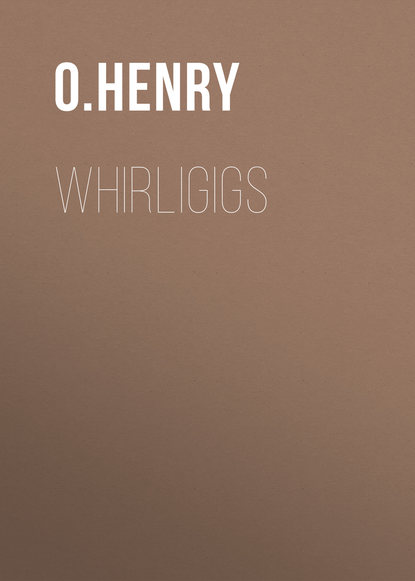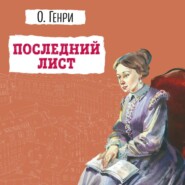По всем вопросам обращайтесь на: info@litportal.ru
(©) 2003-2024.
✖
Whirligigs
Настройки чтения
Размер шрифта
Высота строк
Поля
"Is that you already, sister?" drawled a sweet, childish voice from the darkness.
"It's only ould Father Denny come to see ye, darlin'; and a foine gentleman I've brought to make ye a gr-r-and call. And ye resaves us fast aslape in bed! Shame on yez manners!"
"Oh, Father Denny, is that you? I'm glad. And will you light the lamp, please? It's on the table by the door. And quit talking like Mother Geehan, Father Denny."
The priest lit the lamp, and Lorison saw a tiny, towsled-haired boy, with a thin, delicate face, sitting up in a small bed in a corner. Quickly, also, his rapid glance considered the room and its contents. It was furnished with more than comfort, and its adornments plainly indicated a woman's discerning taste. An open door beyond revealed the blackness of an adjoining room's interior.
The boy clutched both of Father Rogan's hands. "I'm so glad you came," he said; "but why did you come in the night? Did sister send you?"
"Off wid ye! Am I to be sint about, at me age, as was Terence McShane, of Ballymahone? I come on me own r-r-responsibility."
Lorison had also advanced to the boy's bedside. He was fond of children; and the wee fellow, laying himself down to sleep alone in that dark room, stirred-his heart.
"Aren't you afraid, little man?" he asked, stooping down beside him.
"Sometimes," answered the boy, with a shy smile, "when the rats make too much noise. But nearly every night, when sister goes out, Mother Geehan stays a while with me, and tells me funny stories. I'm not often afraid, sir."
"This brave little gentleman," said Father Rogan, "is a scholar of mine. Every day from half-past six to half-past eight – when sister comes for him – he stops in my study, and we find out what's in the inside of books. He knows multiplication, division and fractions; and he's troubling me to begin wid the chronicles of Ciaran of Clonmacnoise, Corurac McCullenan and Cuan O'Lochain, the gr-r-reat Irish histhorians." The boy was evidently accustomed to the priest's Celtic pleasantries. A little, appreciative grin was all the attention the insinuation of pedantry received.
Lorison, to have saved his life, could not have put to the child one of those vital questions that were wildly beating about, unanswered, in his own brain. The little fellow was very like Norah; he had the same shining hair and candid eyes.
"Oh, Father Denny," cried the boy, suddenly, "I forgot to tell you! Sister is not going away at night any more! She told me so when she kissed me good night as she was leaving. And she said she was so happy, and then she cried. Wasn't that queer? But I'm glad; aren't you?"
"Yes, lad. And now, ye omadhaun, go to sleep, and say good night; we must be going."
"Which shall I do first, Father Denny?"
"Faith, he's caught me again! Wait till I get the sassenach into the annals of Tageruach, the hagiographer; I'll give him enough of the Irish idiom to make him more respectful."
The light was out, and the small, brave voice bidding them good night from the dark room. They groped downstairs, and tore away from the garrulity of Mother Geehan.
Again the priest steered them through the dim ways, but this time in another direction. His conductor was serenely silent, and Lorison followed his example to the extent of seldom speaking. Serene he could not be. His heart beat suffocatingly in his breast. The following of this blind, menacing trail was pregnant with he knew not what humiliating revelation to be delivered at its end.
They came into a more pretentious street, where trade, it could be surmised, flourished by day. And again the priest paused; this time before a lofty building, whose great doors and windows in the lowest floor were carefully shuttered and barred. Its higher apertures were dark, save in the third story, the windows of which were brilliantly lighted. Lorison's ear caught a distant, regular, pleasing thrumming, as of music above. They stood at an angle of the building. Up, along the side nearest them, mounted an iron stairway. At its top was an upright, illuminated parallelogram. Father Rogan had stopped, and stood, musing.
"I will say this much," he remarked, thoughtfully: "I believe you to be a better man than you think yourself to be, and a better man than I thought some hours ago. But do not take this," he added, with a smile, "as much praise. I promised you a possible deliverance from an unhappy perplexity. I will have to modify that promise. I can only remove the mystery that enhanced that perplexity. Your deliverance depends upon yourself. Come."
He led his companion up the stairway. Halfway up, Lorison caught him by the sleeve. "Remember," he gasped, "I love that woman."
"You desired to know.
"I – Go on."
The priest reached the landing at the top of the stairway. Lorison, behind him, saw that the illuminated space was the glass upper half of a door opening into the lighted room. The rhythmic music increased as they neared it; the stairs shook with the mellow vibrations.
Lorison stopped breathing when he set foot upon the highest step, for the priest stood aside, and motioned him to look through the glass of the door.
His eye, accustomed to the darkness, met first a blinding glare, and then he made out the faces and forms of many people, amid an extravagant display of splendid robings – billowy laces, brilliant-hued finery, ribbons, silks and misty drapery. And then he caught the meaning of that jarring hum, and he saw the tired, pale, happy face of his wife, bending, as were a score of others, over her sewing machine – toiling, toiling. Here was the folly she pursued, and the end of his quest.
But not his deliverance, though even then remorse struck him. His shamed soul fluttered once more before it retired to make room for the other and better one. For, to temper his thrill of joy, the shine of the satin and the glimmer of ornaments recalled the disturbing figure of the bespangled Amazon, and the base duplicate histories lit by the glare of footlights and stolen diamonds. It is past the wisdom of him who only sets the scenes, either to praise or blame the man. But this time his love overcame his scruples. He took a quick step, and reached out his hand for the doorknob. Father Rogan was quicker to arrest it and draw him back.
"You use my trust in you queerly," said the priest sternly. "What are you about to do?"
"I am going to my wife," said Lorison. "Let me pass."
"Listen," said the priest, holding him firmly by the arm. "I am about to put you in possession of a piece of knowledge of which, thus far, you have scarcely proved deserving. I do not think you ever will; but I will not dwell upon that. You see in that room the woman you married, working for a frugal living for herself, and a generous comfort for an idolized brother. This building belongs to the chief costumer of the city. For months the advance orders for the coming Mardi Gras festivals have kept the work going day and night. I myself secured employment here for Norah. She toils here each night from nine o'clock until daylight, and, besides, carries home with her some of the finer costumes, requiring more delicate needlework, and works there part of the day. Somehow, you two have remained strangely ignorant of each other's lives. Are you convinced now that your wife is not walking the streets?"
"Let me go to her," cried Lorison, again struggling, "and beg her forgiveness!'
"Sir," said the priest, "do you owe me nothing? Be quiet. It seems so often that Heaven lets fall its choicest gifts into hands that must be taught to hold them. Listen again. You forgot that repentant sin must not compromise, but look up, for redemption, to the purest and best. You went to her with the fine-spun sophistry that peace could be found in a mutual guilt; and she, fearful of losing what her heart so craved, thought it worth the price to buy it with a desperate, pure, beautiful lie. I have known her since the day she was born; she is as innocent and unsullied in life and deed as a holy saint. In that lowly street where she dwells she first saw the light, and she has lived there ever since, spending her days in generous self-sacrifice for others. Och, ye spalpeen!" continued Father Rogan, raising his finger in kindly anger at Lorison. "What for, I wonder, could she be after making a fool of hersilf, and shamin' her swate soul with lies, for the like of you!"
"Sir," said Lorison, trembling, "say what you please of me. Doubt it as you must, I will yet prove my gratitude to you, and my devotion to her. But let me speak to her once now, let me kneel for just one moment at her feet, and – "
"Tut, tut!" said the priest. "How many acts of a love drama do you think an old bookworm like me capable of witnessing? Besides, what kind of figures do we cut, spying upon the mysteries of midnight millinery! Go to meet your wife to-morrow, as she ordered you, and obey her thereafter, and maybe some time I shall get forgiveness for the part I have played in this night's work. Off wid yez down the shtairs, now! 'Tis late, and an ould man like me should be takin' his rest."
XXIV
MADAME BO-PEEP, OF THE RANCHES
"Aunt Ellen," said Octavia, cheerfully, as she threw her black kid gloves carefully at the dignified Persian cat on the window-seat, "I'm a pauper."
"You are so extreme in your statements, Octavia, dear," said Aunt Ellen, mildly, looking up from her paper. "If you find yourself temporarily in need of some small change for bonbons, you will find my purse in the drawer of the writing desk."
Octavia Beaupree removed her hat and seated herself on a footstool near her aunt's chair, clasping her hands about her knees. Her slim and flexible figure, clad in a modish mourning costume, accommodated itself easily and gracefully to the trying position. Her bright and youthful face, with its pair of sparkling, life-enamoured eyes, tried to compose itself to the seriousness that the occasion seemed to demand.
"You good auntie, it isn't a case of bonbons; it is abject, staring, unpicturesque poverty, with ready-made clothes, gasolined gloves, and probably one o'clock dinners all waiting with the traditional wolf at the door. I've just come from my lawyer, auntie, and, 'Please, ma'am, I ain't got nothink 't all. Flowers, lady? Buttonhole, gentleman? Pencils, sir, three for five, to help a poor widow?' Do I do it nicely, auntie, or, as a bread-winner accomplishment, were my lessons in elocution entirely wasted?"
"Do be serious, my dear," said Aunt Ellen, letting her paper fall to the floor, "long enough to tell me what you mean. Colonel Beaupree's estate – "
"Colonel Beaupree's estate," interrupted Octavia, emphasizing her words with appropriate dramatic gestures, "is of Spanish castellar architecture. Colonel Beaupree's resources are – wind. Colonel Beaupree's stocks are – water. Colonel Beaupree's income is – all in. The statement lacks the legal technicalities to which I have been listening for an hour, but that is what it means when translated."
"Octavia!" Aunt Ellen was now visibly possessed by consternation. "I can hardly believe it. And it was the impression that he was worth a million. And the De Peysters themselves introduced him!"
Octavia rippled out a laugh, and then became properly grave.
"De mortuis nil, auntie – not even the rest of it. The dear old colonel – what a gold brick he was, after all! I paid for my bargain fairly – I'm all here, am I not? – items: eyes, fingers, toes, youth, old family, unquestionable position in society as called for in the contract – no wild-cat stock here." Octavia picked up the morning paper from the floor. "But I'm not going to 'squeal' – isn't that what they call it when you rail at Fortune because you've, lost the game?" She turned the pages of the paper calmly. "'Stock market' – no use for that. 'Society's doings' – that's done. Here is my page – the wish column. A Van Dresser could not be said to 'want' for anything, of course. 'Chamber-maids, cooks, canvassers, stenographers – '"
"Dear," said Aunt Ellen, with a little tremor in her voice, "please do not talk in that way. Even if your affairs are in so unfortunate a condition, there is my three thousand – "
Octavia sprang up lithely, and deposited a smart kiss on the delicate cheek of the prim little elderly maid.
"Blessed auntie, your three thousand is just sufficient to insure your Hyson to be free from willow leaves and keep the Persian in sterilized cream. I know I'd be welcome, but I prefer to strike bottom like Beelzebub rather than hang around like the Peri listening to the music from the side entrance. I'm going to earn my own living. There's nothing else to do. I'm a – Oh, oh, oh! – I had forgotten. There's one thing saved from the wreck. It's a corral – no, a ranch in – let me see – Texas: an asset, dear old Mr. Bannister called it. How pleased he was to show me something he could describe as unencumbered! I've a description of it among those stupid papers he made me bring away with me from his office. I'll try to find it."
Octavia found her shopping-bag, and drew from it a long envelope filled with typewritten documents.
"A ranch in Texas," sighed Aunt Ellen. "It sounds to me more like a liability than an asset. Those are the places where the centipedes are found, and cowboys, and fandangos."
"'The Rancho de las Sombras,'" read Octavia from a sheet of violently purple typewriting, "'is situated one hundred and ten miles southeast of San Antonio, and thirty-eight miles from its nearest railroad station, Nopal, on the I. and G. N. Ranch, consists of 7,680 acres of well-watered land, with title conferred by State patents, and twenty-two sections, or 14,080 acres, partly under yearly running lease and partly bought under State's twenty-year-purchase act. Eight thousand graded merino sheep, with the necessary equipment of horses, vehicles and general ranch paraphernalia. Ranch-house built of brick, with six rooms comfortably furnished according to the requirements of the climate. All within a strong barbed-wire fence.

















